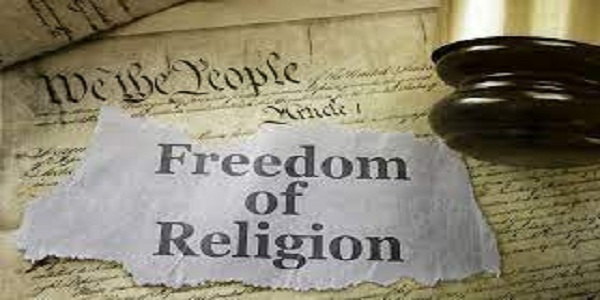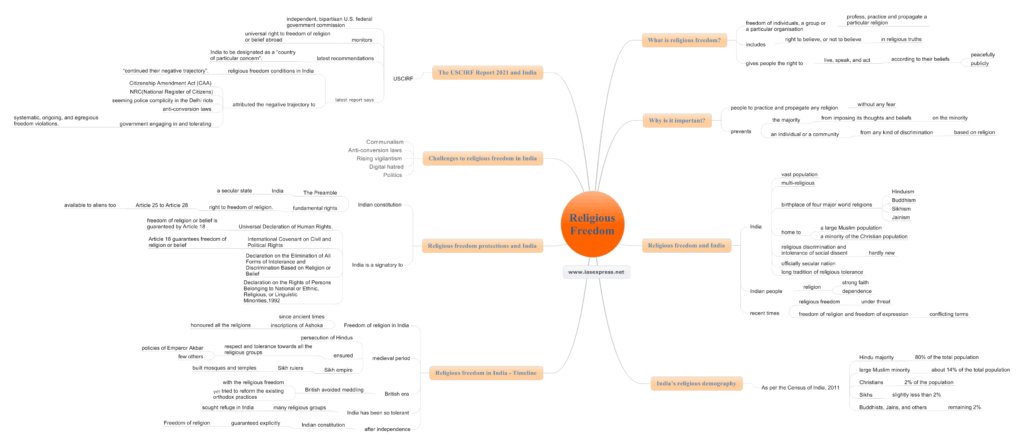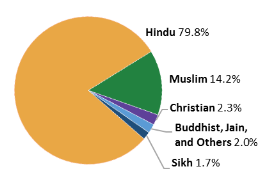Religious Freedom – USCIRF Report and India

From Current Affairs Notes for UPSC » Editorials & In-depths » This topic
IAS EXPRESS Vs UPSC Prelims 2024: 85+ questions reflected
In a recent development, the U.S. Commission on International Religious Freedom (USCIRF), has recommended that the State Department put India on a list (‘Countries of Particular Concern’ or CPCs) for the worst violations of religious freedoms in 2020. The recommendation brings to the limelight the issue of freedom of religion and what is its position in the Indian territory. The recent passage of anti-conversion laws by various State governments in India has further helped in highlighting the issue. With the rise in encroachment on people’s religious freedom by various state and non-state actors, the issue has become a grave matter of concern. The issue not only raises numerous questions about various rights available to people but also shows how such rights are under threat in contemporary times.

What is religious freedom?
- Religious freedom refers to the freedom of individuals, a group or a particular organisation to profess, practice and propagate a particular religion.
- It also includes the right to believe, or not to believe, in religious truths.
- It gives people the right to live, speak, and act according to their beliefs peacefully and publicly.
Why is it important?
- Religious freedom allows people to practice and propagate any religion of their choice without any fear.
- It prevents the majority from imposing its thoughts and beliefs on the minority.
- It also prevents an individual or a community from any kind of discrimination based on religion and helps them live a dignified life.
Religious freedom and India
- India with its vast population is a multi-religious country.
- Being a land of diversity, it is the birthplace of four major world religions: Hinduism, Buddhism, Sikhism, and Jainism.
- It is also home to a large Muslim population. It also includes a minority of the Christian population as well.
- Although religious discrimination and intolerance of social dissent are hardly new to India yet it is an officially secular nation.
- India has a long tradition of religious tolerance (with periodic and sometimes serious lapses), which is protected under its constitution.
- Indian people have a strong faith and dependence when it comes to their religion as they perceive that religion adds meaning and reason to their lives.
- In recent times, religious freedom in India has been under threat due to various reasons. It is noticed that freedom of religion and freedom of expression have been on conflicting terms in recent times in India.
- This can be attributed to the multi-cultural and multi-religious nature of Indian territory.
- Hence, it is important to understand the very nature of the demography of India.
India’s religious demography
- As per the Census of India, 2011,
- The population of approximately 1.3 billion includes a Hindu majority of about 80%.
- A large Muslim minority of some 185 million (about 14%; India’s Muslim community is the world’s third-largest, after Indonesia’s and Pakistan’s).
- Christians account for more than 2% of the population (roughly 30 million) and Sikhs slightly less than 2% (about 22 million).
- Buddhists, Jains, and others account for the remaining
 Source-Census of India, 2011
Source-Census of India, 2011
Religious freedom in India – Evolution
- Freedom of religion in India was there since ancient times. The plural nature of Indian society and freedom of all the religions was encapsulated in the inscriptions of Ashoka where he writes that he honoured all the religions.
- Although during the medieval period, few religious communities especially Hindus were persecuted yet the policies of Emperor Akbar and few others ensured that there was respect and tolerance towards all the religious groups.
- Under the Sikh empire, the Sikh rulers built mosques and temples for subjects of various sects.
- During the British era too, the British avoided meddling with the religious freedom of its subjects although it tried to reform the existing orthodox practices with the help of a few Indians that harmed the various marginalised sections of society.
- India has been so tolerant of all the religions that many religious groups (Parsis, Tibetan Buddhists, etc.) have sought refuge in India time and again whenever they faced a threat to their religious freedom.
- Freedom of religion to Indians was guaranteed explicitly when India acquired independence, with the formation of the Indian constitution.
Religious freedom protections and India
- The Preamble of the Indian constitution declares India as a secular state. It implies:
- The state will not identify itself with or be controlled by any religion.
- While the state guarantees to everyone the right to profess whatever religion one chooses to follow, it will not accord any preferential treatment to any of them.
- No discrimination will be shown by the state against any person on account of his religion or faith.
- The right of every citizen, subject to any general condition, to enter any offices under the state, no matter which religion does he/she follow.
- The Indian Constitution guarantees various fundamental rights to the citizens. One of the fundamental rights guaranteed by the constitution also includes the right to freedom of religion.
- Article 25 to Article 28 of the Indian Constitution guarantees the right to freedom of religion to all the citizens residing within the territorial boundaries of the country.
- Freedom of conscience and free profession of religion (Article 25).
- Freedom to manage religious affairs (Article 26).
- Freedom from payment of taxes for promotion of any particular religion (Article 27).
- Freedom to attend religious instructions (Article 28).
- The freedom of religion guaranteed under the Indian Constitution is not confined to its citizens but extends to all persons including an alien.
- India is a signatory to the following –
- Universal Declaration of Human Rights (freedom of religion or belief is guaranteed by Article 18).
- International Covenant on Civil and Political Rights (Article 18 guarantees freedom of religion or belief).
- Declaration on the Elimination of All Forms of Intolerance and Discrimination Based on Religion or Belief.
- Declaration on the Rights of Persons Belonging to National or Ethnic, Religious, or Linguistic Minorities,1992.
Challenges to religious freedom in India
- Communalism – The ideology of communalism holds that one particular community is superior to another one. Such ideologies threaten the religious freedom of fellow citizens or the group which is the target of violence and discrimination. Communalism in India is not new and is rising incessantly given the rise in incidents of riots and killing at various places in India.
- Anti-conversion laws – The passage of anti-conversion laws by various states like Uttar Pradesh and Madhya Pradesh are argued to be contrary to the constitution as they are a hindrance in the “propagation” of one’s religion. They are also considered to be contrary to the idea of freedom of speech and expression.
- Rising vigilantism – Recent cases in various States of cow vigilantism and attack on fellow citizens based on affiliation to a certain religion point to the rising intolerance among people and violent curtailment of the right to freedom of religion and its practice.
- Digital hatred – The instruments of freedom of speech and expression like social media have also become spaces where misinformation and hate speech based on religion are flourishing leading to killings and riots. Although widespread communal violence and rioting have taken place in the past, social media amplify the speed and force of messages that advocate or condone abuse against minorities and allow incendiary speech to spread like wildfire.
- Politics – Politics over religion and politicians supporting a particular religion giving rise to hatred against other communities eventually curtail the religious freedom of the other people living in a multi-religious society like India. Political leaders exploit religion for electoral gain and ultimately promote hate crimes.
The USCIRF Report 2021 and India
- USCIRF(United States Commission on International Religious Freedom is an independent, bipartisan U.S. federal government commission created by the 1998 International Religious Freedom Act (IRFA).
- It monitors the universal right to freedom of religion or belief abroad.
- USCIRF uses international standards to monitor religious freedom violations globally.
- As per the latest recommendations, India to be designated as a “country of particular concern”.
- In its report, USCIRF said that religious freedom conditions in India “continued their negative trajectory”.
- It attributed the negative trajectory of religious freedom in India to the passage of the “religiously discriminatory” Citizenship Amendment Act (CAA) and NRC(National Register of Citizens), seeming police complicity in the Delhi riots, anti-conversion laws and the government engaging in and tolerating systematic, ongoing, and egregious freedom violations.
- However, India denied the allegations laid down in the report.
Conclusion
With time, the views about religion and religious freedom are changing. India being a land of diversity has a lot of challenges to face given this trajectory. Religious freedom is constantly under attack due to rising religious extremism not only in India but all over the world. It is time that freedom of religion or belief is considered to be a human right and efforts are made to protect it.
Practise Question
Q. What is the present status of religious freedom in India and what are the efforts needed to prevent its violations?
If you like this post, please share your feedback in the comments section below so that we will upload more posts like this.

